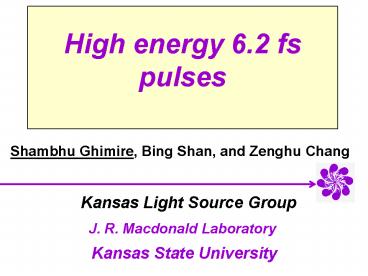Kansas State University
1 / 33
Title:
Kansas State University
Description:
Discrete harmonic orders in the plateau -Spatial analogy of pulse ... Radial distance in micrometer. A Gaussian pulse. Nonlinear index of refraction. nC2. nL2 ... –
Number of Views:28
Avg rating:3.0/5.0
Title: Kansas State University
1
High energy 6.2 fs pulses
Shambhu Ghimire, Bing Shan, and Zenghu Chang
Kansas Light Source Group
J. R. Macdonald Laboratory
Kansas State University
2
Summary
- A shorter pulse ?
- A higher energy pulse?
- Limitations for producing such pulses
- Our approach of obtaining a higher energy
- Measurement of the pulse
- Further possibilities
3
Applications of attosecond pulses
as
ps
zs
fs
10-21 s
10-18 s
10-15 s
10-12 s
Time scale
Progress
4
Attosecond pulse train by HHG
tunnel ionization re-collision
e-
E(t)
HHG
Gas
Driving fs Pulse
e-
HHG as pulse Train
Half Cycle
5
Discrete harmonic orders in the plateau-Spatial
analogy of pulse train interference
Discrete pattern at plateau analogy to multi-slit
diffraction
Single slit
Double slit
Multi slit
Diffraction patterns (spatial frequency)
6
Shorter fs-pulse to get a single atto-pulse
Harmonic generation
fs-pulses
Atto-pulses
With 25 fs pulses
With 10 fs pulses
?? Super continuum at near cutoff
With 5 fs pulses
??
Traditional method generation of single
atto-second pulses
7
Polarization gating for a single atto-pulse
e-
Right Circular Pulse
e-
e-
Td
Ellipticity dependent pulse
Left Circular Pulse
P. B. Corkum, N. H. Burnett, and M. Y. Ivanov,
Opt. Lett. 19, 1870 (1994) V. T. Platonenko and
V. V. Strelkov J. Opt. Soc. Am. B 16, 435 (1999)
8
1) Polarization gating method
High energy, ultra-short pulse
Limits
Using a shorter pulse
available short pulse
Shorter gate
Using a longer delay
final energy at gate
2) Traditional method
To cover broader wavelength range of a atto-pulse
9
Our goal
To scale up the energy of a few cycle pulses
10
Spectral broadening by SPM
I (w)
I (t)
n(t)
Non linear medium
no
I (w)
11
Pulse compression by - GVD
Self Phase modulation
Compressor
12
Experimental setupGeneration of a few cycle
pulses
O D 6mm I D 0.4mm
f 1m
f 2.5 m
Ar- gas
FROG
Hollow core fiber/ chirp compressor technique
13
Previous work and Limitations
Higher Energy 0.5 mJ1
- Self focusing along with self phase modulation
- Self de-focusing by plasma formation
Shorter Pulse Duration 5 fs 1
- Achievable spectral broadening by SPM
- Bandwidth limitation of compressor technique
1S. Sartania, Z. Cheng, M. Lenzner, G. Tempea,
Ch. Spielmann, and F. Krausz, Optic Letters,
22,20 (1997).
14
Limitations
non2I (r)
Self-focusing
I (r)
f1m
n (I) no n2 I
n (I) no - Ne/ 2Ncr
f1m
I (r)
no - n e
Self-defocusing
15
Our approach
Higher Energy
Linear polarization input
Circular polarization input
- lower self-focusing with circular polarization
- Reduced ionization greatly reduces self
de-focusing
Shorter Pulse Duration
- Broader spectrum with higher input circular
polarization
16
Reducing self focusing
Nonlinear index of refraction
A Gaussian pulse
n (r) no nL2 I (r)
n (r) no nC2 I (r)
nL2
1.5
nC2
Radial distance in micrometer
17
Preserving self phase modulation
Chirp parameter
Output band width
Circular polarization input
Linear polarization input
n (r) no nC2. I (r)
n (r) no nL2 . I (r)
18
Reducing self defocusing
Reducing field by 0.7 reduces ionization by gt1
order
Tunneling ionization
Multiphoton ionization
Selection rule Less ionization channels in
circular
F.A. Ilkov et al. J. Phys. B, 25 (1992) A.M.
Perelomov et al. JETP, 24, (1966)
19
Reducing self defocusing
Lower field of circular input lead to decrease in
ionization
By using circular polarization input
20
Combined effects SF and SDF
Complicated profile
Linear input
SDF
SF
Single mode
Circular input
21
Measured spatial profiles
vacuum
Ar-gas
Ar-gas
Ar-gas
Linear
a)
b)
c)
d)
Input Energy
1.0 mJ
1.2 mJ
0.55 mJ
1.2 mJ
Circular
22
Throughput energy in vacuum
23
Scaling up energy by circular polarization
Ar-gas pressure at 1 atm
24
Scaling up energy by circular polarization
Ar-gas pressure at 0.5 atm
25
Broader spectrum for circular input
At circular threshold
Circular At linear threshold
At linear threshold
Ar-gas pressure at 0.5 atm
26
Measurement of the pulsesFROG- Experimental
setup
Time (f s)
Wavelength (nm)
50 BS
BBO Crystal
I (t-?)
Filter
Time Delay Stage
I(t)
lens
Spectrometer and CCD
27
Measurement of pulsesmeasured FROG traces
Input pulse
Output pulse
Time delay ( fs )
Time delay ( fs )
Wavelength (nm)
Wavelength (nm)
1 pixel horizontal 0.291 nm, 1pixel vertical
0.716 fs
28
Measurement of input pulses
29
Measurement of input pulses
Measured
Frequency
Time
Reconstructed
Frequency
Time
(d)
30
Measurement of output pulses
0.6 mJ, 6.2 fs pulses at rep. rate of 1k Hz
31
Measurement of output pulses
Measured
Frequency
(d)
Time
Reconstructed
Frequency
Time
32
Results
- 0.6 mJ, 6.2 fs pulses by Hollow Core/Chirp
compressor technique - Scaling up the pulse energy by a factor of 1.5 by
using circular input - Demonstration of measurement of sub-10 fs pulses
with SHG-FROG
33
Further possibilities
- Obtaining even higher energy and a shorter pulse
- By lowering gas pressure and further increasing
input energy - By using Ne gas instead of Ar
- By improving the compressor technique to compress
a broader spectra































